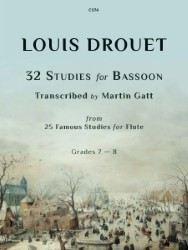Faure's poignant love song Apres un réve exists in many different transcriptions for various instruments (the most famous version perhaps being the one for cello…
Faure’s poignant love song Apres un réve exists in many different transcriptions for various instruments (the most famous version perhaps being the one for cello and piano that Pablo Casals made in 1910), and provides the initial inspiration for this album of French songs transcribed for bassoon and piano.
The bassoon is capable of a broad range of timbres and expression, and it is the lyrical, vocal quality of the instrument that Martin Gatt has always been attracted to.
In both his performance and teaching, his emphasis is on the importance of what he calls ‘vocalising’ through the bassoon, and for him, music for the voice – especially art songs of the 19th and 20th centuries – has been a rich source of material for exploring the expressive tonal colours of the bassoon.
The treasure trove of French art song from composers ranging from Claude Arrieu to Louis Vierne, not to mention the greats like Berlioz or Debussy or Ravel, has made the task of choosing which songs to include in this album a difficult one.
In the end, Martin has settled on eight composers who have produced some of the most appealing music in the genre – Camille Saint-Saens (1835-1921), Georges Bizet (1838-1875), Emmanuel Chabrier (1841-1894), Jules Massenet (1842-1912), Gabriel Fauré (1845-1924), Henri Duparc (1848-1933), Cécile Chaminade (1857-1944), and Francis Poulenc (1899-1963).
Rather than grouping by composer, the songs are set out in a way that contrasts different emotional worlds and sentiments, from the vibrant exuberance of Chabrier’s L’Ile heureuse to the gentle melancholy of Poulenc’s Mais mourir. These ‘songs without words’ for the bassoon, clearly demonstrate the instrument’s cantabile qualities, varied nuances, and wide-ranging emotional possibilities.





